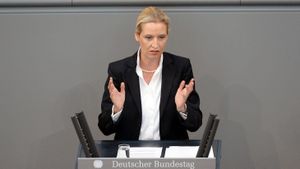Students and supporters have gathered in the Serbian city of Novi Sad, creating waves of protest aimed at tackling what they see as deep-seated corruption within their government. The protests were ignited by the tragic collapse of the concrete canopy at the local railway station three months ago, resulting in the loss of 15 lives.
For over 24 hours, students blocked the Freedom Bridge, with dozens of farmers joining them and parking their tractors nearby to protect the demonstrators from potential clashes with supporters of President Aleksandar Vučić. The bridge blockade coincided with student-led protests happening across Serbia, pressuring the government for accountability.
According to reports from the Associated Press, the protests began as students commemorated the victims of the November 1 tragedy, which many are attributing to corruption and negligence linked to the station’s reconstruction, which involved state-owned Chinese companies. Lucia Maslaković, one of the student leaders, expressed the resolve of the demonstrators by stating, "The only way to stop this is for all our demands to be met." Their demands include obtaining comprehensive documents related to the station's renovation and ensuring accountability for those responsible.
The protests, bolstered by community support and participation, have seen thousands of locals bringing supplies such as tea, coffee, food, and other essentials to those on the bridges. Residents of Novi Sad demonstrated solidarity by participating actively, with many joining the blockade or bringing help to the student protesters.
Following the canopy collapse, many citizens began to question the adequacy of oversight by the government and the safety standards maintained during public works. A significant portion of the public believes the tragedy was the culmination of governmental corruption and mishandling of infrastructure projects. Critics have emphasized the need for thorough investigations and the punishment of those accountable for bypassing safety protocols.
The student protests not only demand justice for the victims but have also served as a broader expression of dissatisfaction with the current political climate under President Vučić, whose government is facing significant challenges. The protests already contributed to the resignation of Prime Minister Miloš Vučević and may lead to more substantial political shifts.
A poignant moment during the protest included students holding a 15-minute silence to honor the deceased victims of the canopy collapse, demonstrating the tragic impetus behind their activism. Many participants, including local university professors, showed their support by praising the organization and maturity of the students. “I support them fully. I can’t believe how well they are organized and mature,” said Jelena Djordjevic, reflecting the dedication of the student body.
The protests attracted thousands, as citizens from across Serbia traveled to Novi Sad to participate, many of them having trekked from Belgrade. The atmosphere was one of hope and urgency, with many participants describing the protests as not just for justice concerning the canopy collapse, but also as part of larger demands for systemic change against pervasive corruption.
Responding to the unrest, President Vučić issued mixed messages, attempting to offer dialogue to the student leaders and university faculty, but simultaneously implying external and foreign influence over the protests. He was quoted stating, "We do not need governments imposed from outside... without elections and not by the will of the people," implying skepticism toward the motives of the protests.
Tightly controlled state media minimized coverage of the protests, sometimes portraying attendance figures inaccurately. Yet, there were notable exceptions where some outlets provided live coverage of the massive turnout, contradicting state narratives claiming little public support.
The student protests have successfully united various segments of the population. Farmers, local residents, and even school children joined forces to demand accountability and transparency. A farmer who joined the protests mentioned the gravity of the situation and described their participation as offering necessary protection against potential incidents.
Community spirit flourished during the demonstrations, with protesters engaging one another with games, food sharing, and music, countering the cold weather. The entire effort has transformed from solely memorializing victims to actively pushing for changes within the political framework of Serbia, effectively igniting hope among the youth for substantial reform.
From these protests arose unity among generations, with older citizens expressing optimism for future leaders, asserting, "I am certain the Gen Z will bring change because I believe in all these young people," as shared by law student Nedeljka Mijanović.
The student-led initiative is framing itself as part of the solution for broader systemic issues, demonstrating the readiness of young Serbians to confront deeply entrenched corruption and demand justice for their peers. With the pressure mounting, the Vučić government may need to reassess its approach before the discontent escalates even more.
The protests are planned to continue as students aim not just for surface-level changes, but for deep reform ensuring accountability and integrity within the Serbian political system. A long-awaited wave of accountability may signal the dawn of a new age of activism and reform, characterized by the resilience and solidarity of Serbia’s youth.



